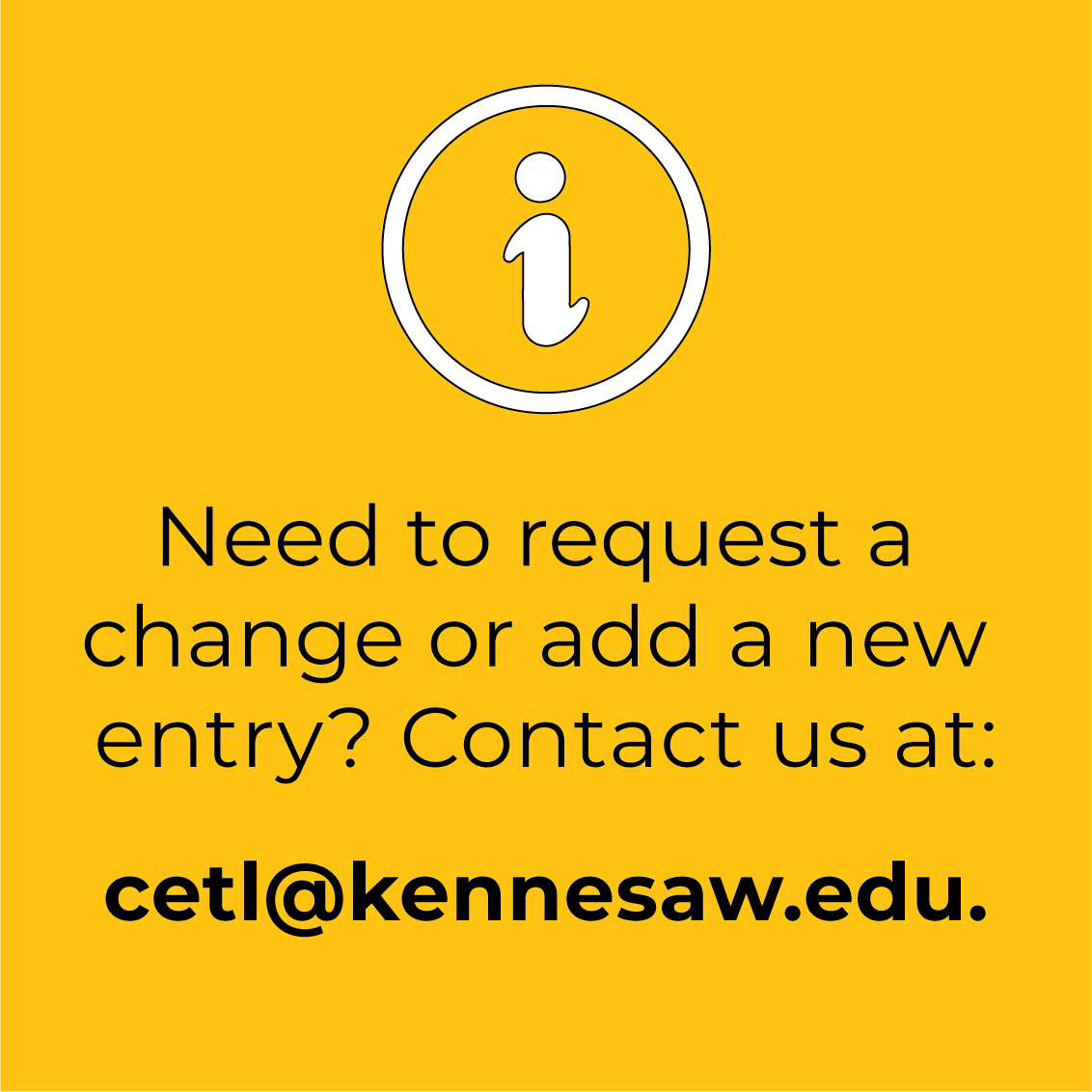CETL provides an extensive list of external disciplinary and interdisciplinary journals
in the Scholarship of Teaching and Learning (SoTL) focused on undergraduate and graduate
education for teachers at colleges and universities, organized alphabetically. Click
on the title of a journal to visit its home page.
You can filter results using the “Topic in Higher Education” or “Discipline” drop-down
menus. To return to the full list, set the drop-down menu options to “Any.”
This directory was last updated in April, 2024. To submit a request to make a change
or an addition to this list, please contact us at cetl@kennesaw.edu.
KSU faculty can find a specific journal title or access full text articles by visiting
the KSU library website.
The aim of BMHE is to identify, promote and publish excellence and innovations in the practice and theory of teaching and learning in business and management disciplines in higher education. Sponsoring Organization: Higher Education Academy – April 29, 2020
The Business Case Journal was established by the Society for Case Research to publish cases and research related to case writing or teaching with cases. Sponsoring Organization: Society for Case Research – April 28, 2020
Publishes high-quality articles in all areas of business education, curriculum, educational methods, educational administration, advances in educational technology and accreditation. Theoretical, empirical and applied manuscripts are welcome for publication consideration. Sponsoring Organization: Institute for Business and Finance Research – April 26, 2020
The Curriculum Forum section includes articles on accounting, basic business, communication, international business, marketing, methods, and technology. In addition, four special sections-research (October), student organizations (December), entrepreneurship (February), and administration and supervision (April)-are included in the journal. Articles of general interest to business educators such as teaching ideas, trends, and current issues are reported in the Open Forum section of the journal. Sponsoring Organization: National Business Education Association – April 25, 2020
The Journal is a publication of the Canadian Society for the Study of Higher Education. It intends to publish manuscripts on topics that address and are relevant to the Canadian higher education system and its structures, processes, and community; and to promote research with international and comparative dimensions in relation to Canadian higher education. Sponsoring Organization: Canadian Society for the Study of Higher Education – April 24, 2020
Publishes one guest-edited theme issue per year, normally in the fall, and have addressed such topics as Indigenous, Minority, and Heritage Language Education in Canada; Bilingualism in a Plurilingual Canada: Research and Implications; Current Developments in Form-Focused Interaction and L2 Acquisition; French Immersion Education: Benefits for All Learners; Information and Communication Technologies(ICTs) and the Learning and Teaching of Second Languages; Language Assessment; Multilingual Literacies; and Second Language Vocabulary Acquisition. Sponsoring Organization: University of Toronto Press – April 23, 2020
The Canadian Journal of University Continuing Education was published from 1995-2016 with two primary objectives. The first was to advance and disseminate knowledge by publishing analytical and research papers, reports, reviews, and commentaries of value to professional practice in continuing education in general, and university continuing education in particular. The second was to encourage dialogue about continuing education within and among relevant professional and academic communities. Sponsoring Organization: Canadian Association for University Continuing Education – April 23, 2020
An online quarterly journal published by the American Society for Cell Biology (ASCB). The Journal publishes original, previously unpublished, peer-reviewed articles on life science education at the K-12 outreach, undergraduate and graduate levels. A particular focus is on how students are introduced to the study of life sciences, as well as approaches in cell biology, developmental biology, neuroscience, biochemistry, molecular biology, genetics, genomics, bioinformatics, and proteomics. Sponsoring Organization: American Society for Cell Biology – April 21, 2020
Change, which is published six times a year, is intended for reflective practitioners in colleges, universities, corporations, government, and elsewhere. Its readers include faculty, administrators, trustees, state and federal officials, accreditors, foundation officers, and students. A magazine rather than an academic journal, Change deals with contemporary issues in higher education. It spotlights trends; provides new insights and ideas; and analyzes the implications of educational programs, policies, and practices. Sponsoring Organization: Taylor & Francis – April 20, 2020
Publishes papers in the broad field of chemical engineering education. Papers generally describe a course, a laboratory, a ChE department, a ChE educator, a ChE curriculum, research program, machine computation, special instructional programs, or give views and opinions on various topics of interest to the profession. Sponsoring Organization: American Society for Engineering Education – April 19, 2020













